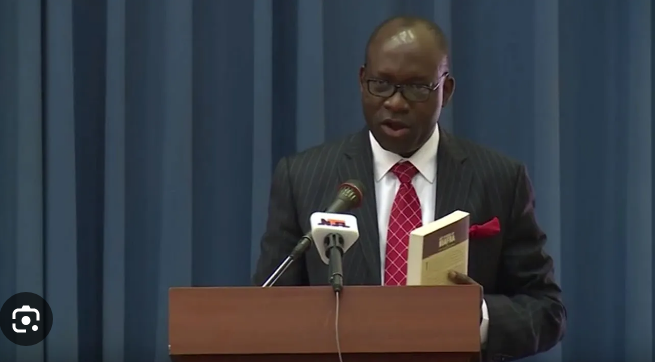Governor Chukwuma Soludo of Anambra State has articulated a compelling vision for Nigeria’s future, centered on ideologically driven political parties and a renewed sense of national identity. He argued that nation-building is a continuous process requiring open dialogue and that Nigeria must move beyond mere rhetoric to embrace concrete institutional reforms and inclusive policies. Soludo emphasized the need to imbue political parties with a sense of purpose beyond the pursuit of power, advocating for ideologically driven platforms that can articulate clear visions for the country’s future. This, he believes, is crucial for fostering healthy political competition and offering citizens genuine choices based on policy rather than personality or ethnic affiliations. He also called for a “rebirth” of the Nigerian citizen, emphasizing the need to cultivate a shared sense of national identity and purpose, transcending the divisive forces of ethnicity, religion, and regionalism.
Soludo’s vision for a renewed Nigeria rests on the principle of “One State, One People, One Agenda.” He highlighted his administration’s approach in Anambra State as a model, illustrating how prioritizing development based on need, rather than political considerations, can foster unity and progress. He cited the strategic placement of infrastructure projects, such as general hospitals and urban regeneration initiatives, in areas based on demonstrable need rather than political expediency, as evidence of his commitment to equitable development. This approach, he argued, helps to build trust between the government and the governed, fostering a sense of shared ownership and responsibility for national development. He further advocated for the establishment of a federal bureau to address grievances and perceived injustices against citizens by the state, providing a mechanism for redress and promoting a sense of fairness and equity.
The governor also addressed the critical issue of citizenship, arguing that the current system, which often marginalizes individuals based on their state of origin, undermines the very fabric of national unity. He stressed the importance of creating a truly inclusive society where every citizen, regardless of their background, feels a sense of belonging and equal opportunity. This, he believes, requires a fundamental shift in mindset and a commitment to dismantling the discriminatory practices that perpetuate inequality and division. He challenged the notion that belonging should be contingent on origin, advocating instead for a system that recognizes and values the contributions of all citizens, regardless of where they come from.
Furthermore, Soludo commended President Tinubu’s bold economic reforms, describing them as crucial for rescuing the Nigerian economy from the brink of collapse. He acknowledged the challenges that still lie ahead but expressed confidence in the President’s ability to steer the country towards economic recovery and stability. He characterized the state of the economy prior to Tinubu’s administration as a “standing dead horse,” highlighting the dire financial situation and the potential for catastrophic consequences, such as mass retrenchment of workers and unpaid salaries and pensions. He credited the current administration’s structural reforms with putting public finances back on a solvency path and leading to a positive recovery of macro fundamentals. He urged the President and his team to remain resolute in their efforts.
Beyond economic reforms, Soludo emphasized the importance of designing government programs that uplift all segments of society, particularly the most vulnerable. He contrasted this approach with the often-prevalent practice of patronage and nepotism, arguing that true development requires prioritizing the needs of the people over political expediency. He showcased Anambra State as a model of inclusive governance, citing examples of appointments based on merit rather than political affiliation, religion, or state of origin. This, he believes, is essential for building a strong and united nation where every citizen has an equal opportunity to contribute to the common good.
In conclusion, Governor Soludo’s vision for rebuilding Nigeria revolves around three fundamental pillars: ideologically driven political parties, a renewed sense of national identity and citizenship, and inclusive governance that prioritizes the needs of all citizens. He believes that by embracing these principles, Nigeria can overcome its current challenges and build a more prosperous and united future. He commended President Tinubu’s efforts toward inclusive governance and economic reform, urging him to stay the course. Soludo’s message is a call for a fundamental shift in mindset and a commitment to building a Nigeria where every citizen has a sense of belonging and an equal opportunity to thrive. He challenged all Nigerians to rise to the occasion and contribute to the ongoing project of nation-building.














